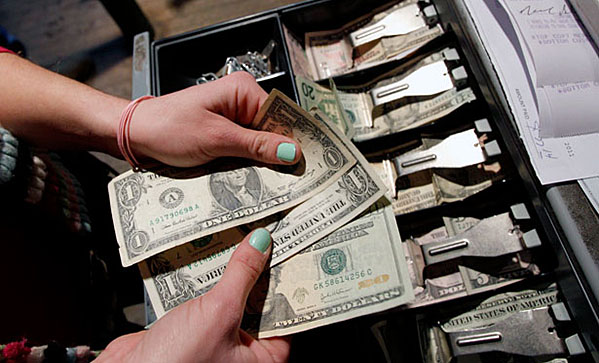Sixty-four per cent of small businesses have reported experiencing employee theft. Only sixteen per cent ever reported the theft to the police, though.
This comes from a recent survey of small businesses on the subject of employee theft. Over three hundred businesses were surveyed, among them financial services, banks, retail, restaurants, and small manufacturers. Some of the small businesses had as many as 350 workers, but most had under a hundred. The major findings:
Cash is the target. Forty per cent of small business thefts were of money, the average amount being $20,000. Eighteen per cent were products sold by the business, twelve per cent were of raw materials, eight per cent were tools, six per cent were equipment, and the remainder consisted of office supplies, time-card manipulation, fuel, other stuff.
Theft happens over time. Most of the thefts surveyed were not one-time incidents, but were what researchers called “on-going schemes”. Sixty-one per cent of the thefts were on-going schemes, where on-going could be from about two weeks to twenty years. The average time before being caught was sixteen months. According to researchers, “Generally, the theft is found out by sheer luck. Say the employee who is stealing goes on vacation, and someone else steps in to take over duties. The person stepping in notices something funny and begins asking questions.”
Low-level employees are the most likely to steal. In fact, around sixty per cent of employees stealing were classified as “general” or first-line. Up one level, twenty per cent were managers or executives. Surprisingly, only two per cent of cashiers were likely to steal.
Crimes are frequently unreported. As we mentioned, only sixteen per cent of small businesses reported the theft. What gives? Well, according to the report, there are four main factors behind the low rate of reporting. Firstly, the business owner might not see the crime as serious enough to spend more time on it than necessary. Secondly, if the owner speaks with their attorney, they might find that the cost of a prosecution is much higher than they’d like, or that they’d be unlikely to recoup most of their costs. Thirdly, there’s an emotion factor. According to the researchers, “In the intimate environments that are small businesses, you may know this person’s spouse and children, or may see him or her in family settings at the holidays. All in all, you just want to put the betrayal behind you as much and as quickly as you can.” Finally, business owners might see the police or justice system as incompetent or corrupt; the researchers note that many don’t realize that most police departments have specialized financial crimes units.
So, where might that leave you, the small business owner? Well, pay attention to your cash, but not just to cashiers: shrinkage is likely happening elsewhere. And don’t wait to discover theft by mere chance: start looking for patterns and checking over work. Finally, don’t write off the police; you’re paying their salary too, after all. With that said, realize that you might not be able to stomach the betrayal, and that might be why your employee-turned-thief walks.


